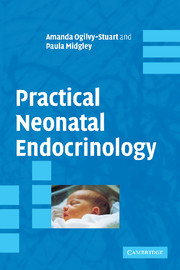Book contents
- Frontmatter
- Contents
- Acknowledgements
- Introduction
- 1 Hyperglycaemia
- 2 Hypoglycaemia
- 3 Management of hyperinsulinism
- 4 Hypoglycaemia in infant of a diabetic mother
- 5 Dysmorphic features
- 6 Micropenis
- 7 Hypopituitarism
- 8 Ambiguous genitalia (male): XY disorders of sex development
- 9 Cryptorchidism
- 10 Ambiguous genitalia (female): XX disorders of sex development
- 11 Pigmented scrotum
- 12 Adrenal failure
- 13 Collapse
- 14 Hypotension
- 15 Hyponatraemia
- 16 Hyperkalaemia
- 17 Hypernatraemia
- 18 Maternal steroid excess
- 19 Hypercalcaemia
- 20 Hypocalcaemia
- 21 Investigation and management of babies of mothers with thyroid disease
- 22 Maternal or familial thyroid disease
- 23 Goitre
- 24 Abnormal neonatal thyroid function tests
- 25 Hypothyroxinaemia in preterm infants
- Appendix 1 Calculation of glucose infusion rate
- Appendix 2 Dynamic tests
- Appendix 3 Normal ranges
- Appendix 4 Biochemistry samples
- Appendix 5 Formulary
- Index
2 - Hypoglycaemia
Published online by Cambridge University Press: 15 February 2010
- Frontmatter
- Contents
- Acknowledgements
- Introduction
- 1 Hyperglycaemia
- 2 Hypoglycaemia
- 3 Management of hyperinsulinism
- 4 Hypoglycaemia in infant of a diabetic mother
- 5 Dysmorphic features
- 6 Micropenis
- 7 Hypopituitarism
- 8 Ambiguous genitalia (male): XY disorders of sex development
- 9 Cryptorchidism
- 10 Ambiguous genitalia (female): XX disorders of sex development
- 11 Pigmented scrotum
- 12 Adrenal failure
- 13 Collapse
- 14 Hypotension
- 15 Hyponatraemia
- 16 Hyperkalaemia
- 17 Hypernatraemia
- 18 Maternal steroid excess
- 19 Hypercalcaemia
- 20 Hypocalcaemia
- 21 Investigation and management of babies of mothers with thyroid disease
- 22 Maternal or familial thyroid disease
- 23 Goitre
- 24 Abnormal neonatal thyroid function tests
- 25 Hypothyroxinaemia in preterm infants
- Appendix 1 Calculation of glucose infusion rate
- Appendix 2 Dynamic tests
- Appendix 3 Normal ranges
- Appendix 4 Biochemistry samples
- Appendix 5 Formulary
- Index
Summary
Clinical presentation
Hypoglycaemia may be picked up incidentally in an asymptomatic baby.
Blood glucose should be measured regularly in vulnerable babies (see below).
Symptoms are non-specific:
Neuroglycopaenic symptoms of hypoglycaemia include apnoea, hypotonia, jittering, irritability, lethargy, abnormal cry, feeding problems, convulsions, and coma.
Autonomic symptoms (pallor, sweating, tachypnoea) are generally not prominent in the newborn.
Macrosomia may be present in infants of diabetic mothers.
Macrosomia in the absence of a history of maternal diabetes suggests hyperinsulinism.
Macrosomia with magroglossia, organomegaly, exomphalos, or ear lobe creases suggests Beckwith–Wiedemann syndrome (approximately 80% demonstrate genotypic abnormalities of the distal region of chromosome 11p).
Midline defects, micropenis, and jaundice suggest hypopituitarism (see Chapter 7).
Babies can have low blood glucose levels and be completely asymptomatic.
Approach to the problem
Asymptomatic healthy term babies of normal birth weight (9th to 91st centiles) do not require blood sugar measurements.
Symptomatic hypoglycaemia in a term baby is always pathological until proved otherwise.
Babies at risk of hypoglycaemia
Preterm or intrauterine growth retardation: lack of glycogen stores, immature enzymes involved in glucose homoeostasis, inappropriately high insulin levels.
History of birth depression: lack of glycogen stores due to utilization.
Infants of diabetic mothers, large-for-dates babies, babies with Beckwith–Wiedemann syndrome, babies with rhesus disease: excessive insulin secretion.
Polycythaemia: excessive metabolism of glucose by erythrocytes.
Congenital heart disease, sepsis, hypothermia: excessive glucose demands.
[…]
- Type
- Chapter
- Information
- Practical Neonatal Endocrinology , pp. 7 - 16Publisher: Cambridge University PressPrint publication year: 2006
- 1
- Cited by

